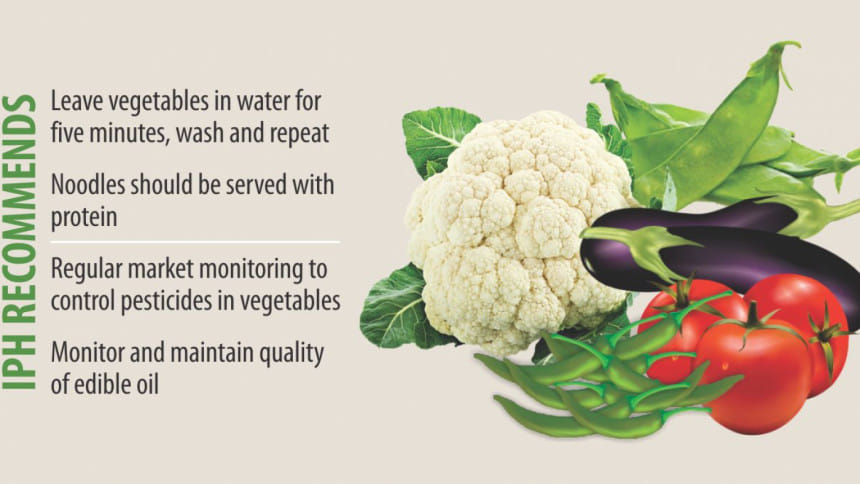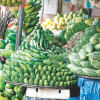Some veggies not that safe

Consumers in Bangladesh are still unsure if the vegetables in their daily dishes are safe even though four years have gone by since the Food Safety Act was enacted.
A food safety authority was also formed in 2015 but a government lab test has found pesticide residues in a number of samples of vegetables. Residue levels in some of them were even alarming.
The test also found that the majority of the edible oil samples lacked “standard values of oil characteristics”, and some noodles had less than desired levels of protein in them.
The Institute of Public Health (IPH) carried out the chemical and microbiological contamination test at the National Food Safety Laboratory between January and March and revealed the results yesterday.
It took 30 samples of eggplants, tomatoes, cauliflowers, green chillies and country beans from 15 kitchen markets in the capital and five district towns for the tests.
Of the 150 samples, around 30 percent had pesticide residues, and chillies and beans were the worst with almost half of them contaminated.
The IPH, however, noted that following a first and a second wash of chillies, pesticide residues reduced 41 and 61 percent respectively but four samples still had alarming levels of contamination, above the maximum residue limit (MRL).
Half the beans samples had pesticide residues and one sample had above the residue limit.
Of the 30 cauliflower samples, 12 had pesticide residues while one eggplant was found contaminated.
The vegetables had residues of Chloropyrifos and Dimethoate brands of pesticides, which are used for killing insects and worms. Introduced in the 1950's and 60's by two US companies, they attack the nervous system of pests and are rated highly toxic and hazardous.
Referring to a World Health Organisation (WHO) estimate, an earlier IPH report had said there were three million global cases of acute and severe pesticide poisoning with some 220,000 deaths every year, the majority of which were in developing countries.
The IPH could not offer any country-specific statistics.
It also carried out tests on samples of noodles, edible oil and snacks sold outside schools.
It found less than desired level of proteins in 13 out of 55 noodle samples of different brands.
The IPH also found compromised quality in samples of mustard and soybean oil, and ghee. The moisture and fatty acid levels of many edible oil samples were not up to the mark.
"To know the quality of edible oil, 96 samples were tested. The chemical analysis of all the samples indicated that the majority of brand and unpacked oil of mustard, soybean and ghee are not maintaining the standard values of oil characteristics," reads the IPH report.
The IPH's tests on street food revealed that the majority of jhalmuri, fuchka, velpuri samples had higher than permissible levels of coliforms (bacteria) and yeast moulds.
Interestingly, pickle samples fared much better in terms of food safety.
Talking to The Daily Star yesterday, Prof Shahnila Ferdousi, head of the National Food Safety Laboratory, said their test results reflected that all stakeholders of safe food need to be more active in ensuring food safety from farm-to-fork.
She referred to their previous study that had also showed concentration of pesticides in different vegetables. She hoped more awareness would be created among farmers about judicious and proper application of pesticides.
Prof Shahnila considered the role of Bangladesh Food Safety Authority to be crucial and told The Daily Star that IPH has shared its findings with the authority.
With the support of the UN Food and Agriculture Organisation (FAO), the food safety lab was established and subsequently declared as the national reference laboratory by the Ministry of Health and Family Welfare.
The Food Safety Act, 2013, came into being hard on the heels of a nationwide outcry over unbridled food adulteration. The government formed the laboratory in February 2015, with a promise to give consumers relief from toxins and contaminants in food.


 For all latest news, follow The Daily Star's Google News channel.
For all latest news, follow The Daily Star's Google News channel. 






Comments